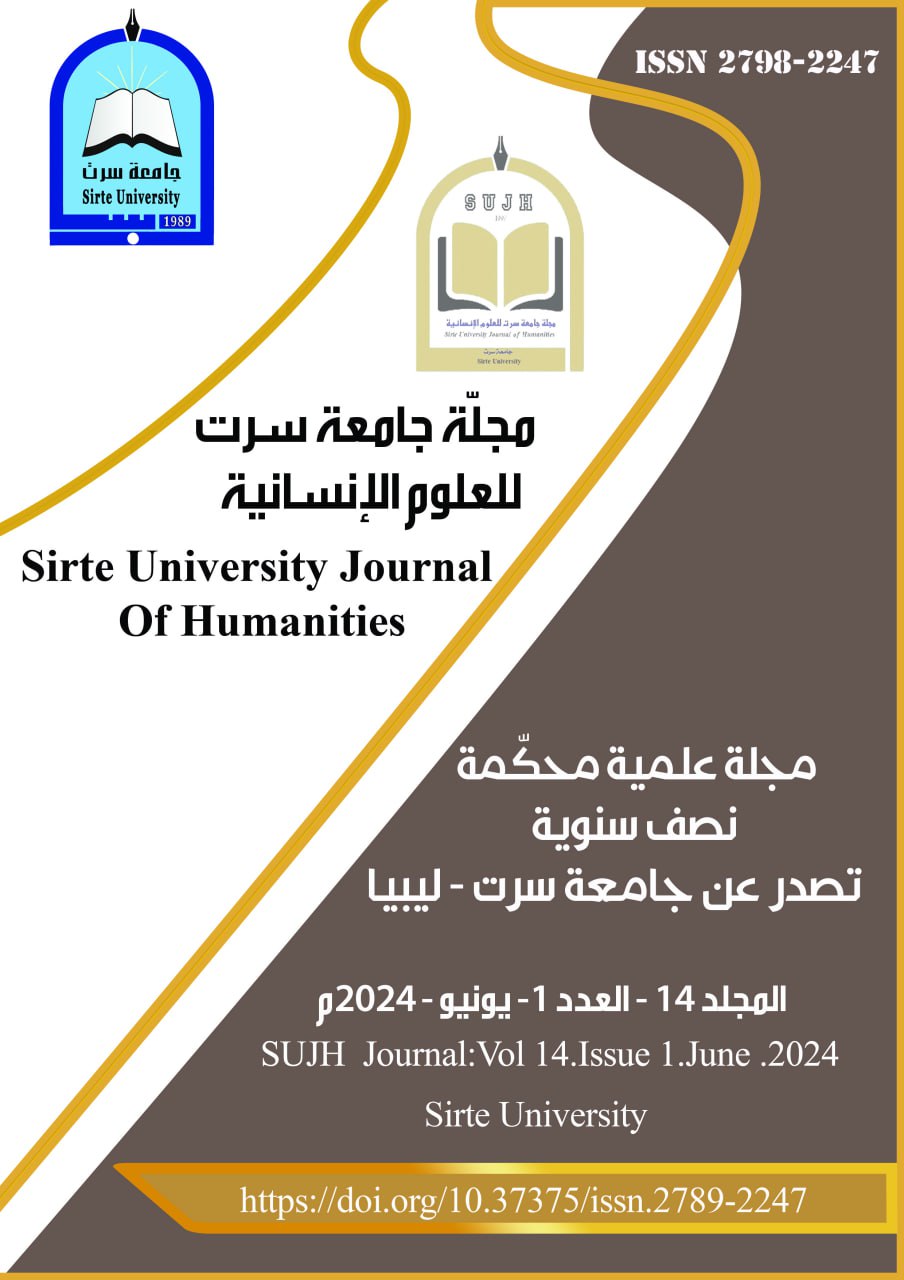العلاقة بين جودة الإفصاح عن المسؤولية الاجتماعية وإدارة الأرباح دراسة تطبيقية على الشركات الصناعية الليبية
DOI:
https://doi.org/10.37375/sujh.v14i1.2782الكلمات المفتاحية:
الإفصاح عن الاستدامة، جودة الأرباح، إدارة الأرباح،، الشركات الصناعية الليبيةالملخص
تهدف الدراسة الحالية إلى اختبار العلاقة بين جودة الإفصاح عن المسؤولية الاجتماعية وإدارة الأرباح. ومن أجل التحقق من هذه العلاقة تَمّ قياس جودة الإفصاح عن المسؤولية الاجتماعية باستخدام أنموذج متعدد الأبعاد، في حين تَمّ قياس إدارة الأرباح باستخدام طريقتين مختلفتين (أساس الاستحقاق وأساس النشاط الحقيقي)، بالتطبيق على عينة من الشركات الصناعية الليبية للفترة من 2016 إلى 2020. أظهرت نتائج هذه الدراسة أنّ جودة الإفصاح عن المسؤولية الاجتماعية له تأثير سلبي على إدارة الأرباح، مما يشير إلى أنّ الشركات التي تقدّم إفصاح عن المسؤولية الاجتماعية يعكس حقيقة نشاطها البيئي والاجتماعي من المتوقع أنْ تفصح عن تقارير مالية ذات مصداقية أعلى من خلال جودة الأرباح المفصح عنها.
المراجع
Alipour, M., Ghanbari, M., Jamshidinavid, B., & Taherabadi, A. (2019). The relationship between environmental disclosure quality and earnings quality: a panel study of an emerging market. Journal of Asia Business Studies, 13(2), 326-347.
Alotaibi, K., & Hussainey, K. (2016). Determinants of CSR disclosure quantity and quality: Evidence from non-financial listed firms in Saudi Arabia. International Journal of Disclosure and Governance, 13(4), 364-393.
Amasiatu, K. M., Okoye, E. I., & Adeniyi, S. I. (2023). Corporate attributes and earnings management of non financial firms listed on the Nigeria exchange limited. Journal of Global Accounting, 9(3), 134-154.
Anglin, P., Edelstein, R., Gao, Y., & Tsang, D. (2013). What is the relationship between REIT governance and earnings management?. Journal of Real Estate Finance & Economics, 47(3), 538-563.
Beattie, V. & Thomson, S. (2007). Lifting the lid on the use of content analysis to investigate intellectual capital disclosures. Accounting Forum, 31(2) 129-163.
Beattie, V., McInnes, B., & Fearnley, S. (2004, September). A methodology for analysing and evaluating narratives in annual reports: a comprehensive descriptive profile and metrics for disclosure quality attributes. Accounting forum, 28(3) 205-236.
Belgacem, I., & Omri, A. (2015). Does corporate social disclosure affect earnings quality? Empirical evidence from Tunisia. International Journal, 3(2), 73-89.
Beretta, S., & Bozzolan, S. (2008). Quality versus quantity: The case of forward-looking disclosure. Journal of Accounting, Auditing & Finance, 23(3), 333-376.
Botosan, C. A. (2004). Discussion of a framework for the analysis of firm risk communication. The International Journal of Accounting, 39(3), 289-295.
Chakroun, R. (2013). Family control, board of directors' independence and extent of voluntary disclosure in the annual reports: Case of Tunisian companies. Journal of Business Studies Quarterly, 5(1), 22.
Chih, H., Shen, C., & Kang, F. (2008). Corporate social responsibility, investor protection, and earnings management: Some international evidence. Journal of Business Ethics, 79(1-2), 179-198.
Choi, B. B., Lee, D., & Park, Y. (2013). Corporate social responsibility, corporate governance and earnings quality: Evidence from Korea. Corporate Governance: An International Review, 21(5), 447-467.
Christensen, T. E., Huffman, A., Lewis‐Western, M. F., & Scott, R. (2022). Accruals earnings management proxies: Prudent business decisions or earnings manipulation?. Journal of Business Finance & Accounting, 49(3-4), 536-587.
Clark, T. S., & Linzer, D. A. (2015). Should I use fixed or random effects?. Political Science Research and Methods, 3(2), 399-408.
Clarkson, P. M., Li, Y., Richardson, G. D., & Vasvari, F. P. (2008). Revisiting the relation between environmental performance and environmental disclosure: An empirical analysis. Accounting, organizations and society, 33(4-5), 303-327.
Cohen, D. A., & Zarowin, P. (2010). Accrual-based and real earnings management activities around seasoned equity offerings. Journal of Accounting and Economics, 50(1), 2-19.
Dechow, P., Sloan, R. and Sweeney, A. (1995). Detecting earnings management. The Accounting Review, 70, 193-225.
Ferentinou, A. C., & Anagnostopoulou, S. C. (2016). Accrual-based and real earnings management before and after IFRS adoption: The case of Greece. Journal of Applied Accounting Research, 17(1), 2-23.
Gaio, C., Goncalves, T., & Sousa, M. V. (2022). Does corporate social responsibility mitigate earnings management?. Management Decision, 60(11), 2972-2989.
Gao, L., & Zhang, J. H. (2015). Firms’ earnings smoothing, corporate social responsibility, and valuation. Journal of Corporate Finance, 32, 108-127.
Gautam, R., & Singh, A. (2010). Corporate social responsibility practices in India: A study of top 500 companies. Global Business and Management Research: An International Journal, 2(1), 41-56.
Ghosh, D., & Olsen, L. (2009). Environmental uncertainty and managers’ use of discretionary accruals. Accounting, Organizations & Society, 34(2), 188-205.
Grougiou, V., Leventis, S., Dedoulis, E., & Owusu-Ansah, S. (2014). Corporate social responsibility and earnings management in U.S. banks. Accounting Forum, 38(3), 155-169.
Gujarati, D., & Porter, D. (2003). Multicollinearity: What happens if the regressors are correlated. Basic econometrics, 363.
Hess, D. (2008). The three pillars of corporate social reporting as new governance regulation: Disclosure, dialogue, and development. Business Ethics Quarterly, 18(4), 447-482.
Jonas, G. J., & Blanchet, J. (2000). Assessing quality of financial reporting. Accounting horizons, 14(3), 353-363.
Kansal, M., Joshi, M., & Batra, G. S. (2014). Determinants of corporate social responsibility disclosures: Evidence from India. Advances in Accounting, 30(1), 217-229.
Khan, A., & Azim, M. I. (2015). Corporate social responsibility disclosures and earnings quality. Managerial Auditing Journal, 30(3), 277-298.
Kim, Y., Park, M. S., & Wier, B. (2012). Is earnings quality associated with corporate social responsibility? The Accounting Review, 87(3), 761-796.
Koh, K., Li, H., & Tong, Y. H. (2023). Corporate social responsibility (CSR) performance and stakeholder engagement: Evidence from the quantity and quality of CSR disclosures. Corporate Social Responsibility and Environmental Management, 30(2), 504-517.
Laksmana, I., & Yang, Y. (2009). Corporate citizenship and earnings attributes. Advances in Accounting, 25(1), 40-48.
Liu, H., & Lee, H. A. (2019). The effect of corporate social responsibility on earnings management and tax avoidance in Chinese listed companies. International Journal of Accounting & Information Management, 27(4), 632-652.
Martínez-Ferrero, J., & García-Sánchez, I. M. (2015). Is corporate social responsibility an entrenchment strategy? Evidence in stakeholder protection environments. Review of Managerial Science, 9, 89-114.
Mazereeuw-van der, D. S., Graafland, J., & Kaptein, M. (2014). Religiosity, CSR attitudes, and CSR behavior: An empirical study of executives' religiosity and CSR. Springer Science & Business Media B.V. 123.
McDaniel, L., Martin, R. D., & Maines, L. A. (2002). Evaluating financial reporting quality: The effects of financial expertise vs. financial literacy. The accounting review, 77(s-1), 139-167.
Muttakin, M. B., Khan, A., & Azim, M. I. (2015). Corporate social responsibility disclosures and earnings quality: Are they a reflection of managers’ opportunistic behavior?. Managerial Auditing Journal, 30(3), 277-298.
Oikonomou, I., Platanakis, E., & Sutcliffe, C. (2015). Creating more stable and diversified socially responsible investment portfolios. ICMA Centre, Henley Business School, University of Reading, 35.
Omar, N., Rahman, R. A., Danbatta, B. L., & Sulaiman, S. (2014). Management disclosure and earnings management practices in reducing the implication risk. Procedia-Social and Behavioral Sciences, 145, 88-96.
Pakawaru, M. I., Mayapada, A. G., Afdalia, N., Tanra, A. A. M., & Afdhal, M. (2021). The relationship of corporate social responsibility (CSR) disclosure and earnings management: Evidence from Indonesia. The Journal of Asian Finance, Economics and Business, 8(2), 903-909.
Prior, D., J. Surroca, and J. Tribo. 2008. Are socially responsible managers really ethical? Exploring the relationship between earnings management and corporate social responsibility. Corporate Governance 16 (3): 160–177.
Rao, N., & Dandale, S. (2008). Earnings management: A study of equity rights issues in India. The ICFAI Journal of Applied Finance, 14(11), 20-34.
Razaee, Z., Olibe, K. O., & Minmier, G. (2003). Improving corporate governance: the role of audit committee disclosure. Managerial Auditing Journal, 18(6-7), 530-537.
Roychowdhury, S. (2006). Earnings management through real activities manipulation. Journal of Accounting and Economics, 42(3), 335-370.
Saleh, I., Afifa, M. A., & Haniah, F. (2020). Financial factors affecting earnings management and earnings quality: New evidence from an emerging market. ACRN Journal of Finance and Risk Perspectives, 9.
Salewski, M., & Zülch, H. (2012). The impact of corporate social responsibility (CSR) on financial reporting quality. Evidence from European blue chips. HHL Working Paper Series, No. 112.
Scholtens, B., & Kang, F. C. (2013). Corporate social responsibility and earnings management: Evidence from Asian economies. Corporate Social Responsibility and Environmental Management, 20(2), 95-112.
Shafer, W. E. (2015). Ethical climate, social responsibility, and earnings management. Journal of Business Ethics, 126(1), 43-60.
Shamir, R. (2005). Mind the gap: The commodification of corporate social responsibility. Symbolic Interaction, 28(2), 229-253.
Sun, N., Salama, A., Hussainey, K., & Habbash, M. (2010). Corporate environmental disclosure, corporate governance and earnings management. Managerial Auditing Journal, 25(7), 679-700.
Urquiza, F. B., Navarro, M. C. A., & Trombetta, M. (2009). Disclosure indices design: Does it make a difference. Revista De Contabilidad, 12(2), 81.
Wang, S., Gao, Y., Hodgkinson, G. P., Rousseau, D. M., & Flood, P. C. (2015). Opening the black box of CSR decision making: A policy-capturing study of charitable donation decisions in China. Journal of Business Ethics, 128, 665-683.
Yip, E., van Staden, C., & Cahan, S. (2011). Corporate social responsibility reporting and earnings management: The role of political costs. Australasian Accounting Business & Finance Journal, 5(3), 17-33.
Zgarni, A., & Fedhila, H. (2022). Earnings management through real activities versus accounting techniques: literature review. International Journal of Business Innovation and Research, 29(3), 285-307.











